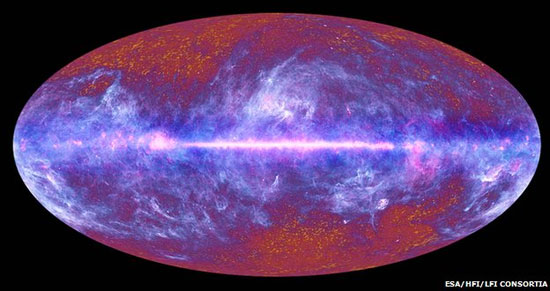Recreate Big Bang radiation
Physicists in the US say they have recreated the form of radiation released by the Big Bang in the laboratory to better understand the development of this structure in the early universe.
Using extremely cold cesium at vacuum in the University of Chicago (USA), experts have created a structure similar to the cosmic microwave background radiation, which is an echo when the universe was born.
'This is the first time there has been an experiment to replicate the evolution of the newborn universe' , according to Astrology Magazine quoted Professor Cheng Chin.

Sky microwave universe - (Photo: ESO)
Under certain conditions, an atomic cloud cooled down to 1 part per cent above absolute zero (-273.15 ° C) in the vacuum room showed a similar phenomenon following the event. Big Bang.
If you want to understand very simply, the Big Bang is an explosion that creates sound, with waves-like movements beginning to interfere with each other, creating complex models, also known as vibrations.
According to the Science report, that is the source of the complexity we see in the current universe.
Chin's team cooled a flat, smooth cloud of about 10,000 cesium atoms to the same temperature, and found they could reproduce vibrations similar to the Big Bang created, expressing an image. about the appearance of the universe for a moment in its early days.
Laboratory reconstructed cesium 'universe' has a diameter of no more than 70 microns, the size of a human hair diameter.
- Before 'Big bang'
- The theory of time
- How dangerous is radiation?
- 4 cosmic phenomena move faster than the speed of light
- Will recreate the big explosion in the universe
- Scientists are about to prove that Einstein is wrong?
- Video: Learn about the two types of radiation that surrounds us
- Using a balloon to bring the telescope up to observe the Big Bang trace
- Decoding the mysterious ray of Dr. Vu Van Bang
- Light in space can come from another universe
- More Cao Bang province has bird flu
- Discover the first evidence of the Big Bang big bang
 Van Allen's belt and evidence that the Apollo 11 mission to the Moon was myth
Van Allen's belt and evidence that the Apollo 11 mission to the Moon was myth The levels of civilization in the universe (Kardashev scale)
The levels of civilization in the universe (Kardashev scale) Today Mars, the sun and the Earth are aligned
Today Mars, the sun and the Earth are aligned The Amazon owner announced a secret plan to build a space base for thousands of people
The Amazon owner announced a secret plan to build a space base for thousands of people